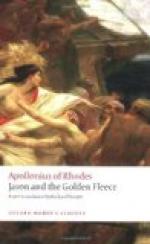“We beseech you, by Zeus the Beholder, whoever ye are, to be kindly and to help us in our need. For fierce tempests, falling on the sea, have shattered all the timbers of the crazy ship in which we were cleaving our path on business bent. Wherefore we entreat you, if haply ye will listen, to grant us just a covering for our bodies, and to pity and succour men in misfortune, your equals in age. Oh, reverence suppliants and strangers for Zeus’ sake, the god of strangers and suppliants. To Zeus belong both suppliants and strangers; and his eye, methinks, beholdeth even us.”
And in reply the son of Aeson prudently questioned him, deeming that the prophecies of Phineus were being fulfilled: “All these things will we straightway grant you with right good will. But come tell me truly in what country ye dwell and what business bids you sail across the sea, and tell me your own glorious names and lineage.”
And him Argus, helpless in his evil plight, addressed: “That one Phrixus an Aeolid reached Aea from Hellas you yourselves have clearly heard ere this, I trow; Phrixus, who came to the city of Aeetes, bestriding a ram, which Hermes had made all gold; and the fleece ye may see even now. The ram, at its own prompting, he then sacrificed to Zeus, son of Cronos, above all, the god of fugitives. And him did Aeetes receive in his palace, and with gladness of heart gave him his daughter Chalciope in marriage without gifts of wooing.[1] From those two are we sprung. But Phrixus died at last, an aged man, in the home of Aeetes; and we, giving heed to our father’s behests, are journeying to Orchomenus to take the possessions of Athamas. And if thou dost desire to learn our names, this is Cytissorus, this Phrontis, and this Melas, and me ye may call Argus.”
[Footnote 1: i.e. without exacting gifts from the bridegroom. So in the Iliad (ix. 146) Agamemnon offers Achilles any of his three daughters [Greek: anhaednos]]
Thus he spake, and the chieftains rejoiced at the meeting, and tended them, much marvelling. And Jason again in turn replied, as was fitting, with these words:
“Surely ye are our kinsmen on my father’s side, and ye pray that with kindly hearts we succour your evil plight. For Cretheus and Athamas were brothers. I am the grandson of Cretheus, and with these comrades here I am journeying from that same Hellas to the city of Aeetes. But of these things we will converse hereafter. And do ye first put clothing upon you. By heaven’s devising, I ween, have ye come to my hands in your sore need.”
He spake, and out of the ship gave them raiment to put on. Then all together they went to the temple of Ares to offer sacrifice of sheep; and in haste they stood round the altar, which was outside the roofless temple, an altar built of pebbles; within a black stone stood fixed, a sacred thing, to which of yore the Amazons all used to pray. Nor was it lawful for them, when they came from the opposite coast, to burn on this altar offerings of sheep and oxen, but they used to slay horses which they kept in great herds. Now when they had sacrificed and eaten the feast prepared, then Aeson’s son spake among them and thus began:




